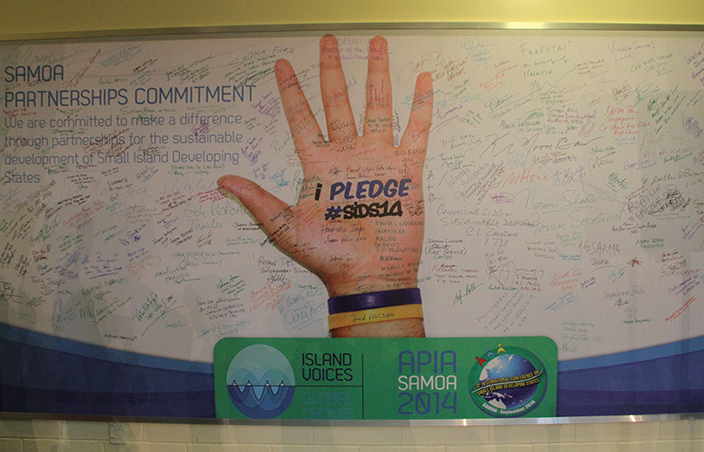The Third International Conference on Small Island developing States (SIDS) generated financial commitments of US$1.9 billion across nearly 300 partnerships, many of which focus on oceans and biodiversity.
At parallel and side events held before and during the Conference, SIDS and their development partners showcased commitments to the sustainable development of oceans, and announced further commitments and goals.
 4 September 2014: The Third International Conference on Small Island developing States (SIDS) generated financial commitments of US$1.9 billion across nearly 300 partnerships, many of which focus on oceans and biodiversity. At parallel and side events held before and during the Conference, SIDS and their development partners showcased commitments to the sustainable development of oceans, and announced further commitments and goals.
4 September 2014: The Third International Conference on Small Island developing States (SIDS) generated financial commitments of US$1.9 billion across nearly 300 partnerships, many of which focus on oceans and biodiversity. At parallel and side events held before and during the Conference, SIDS and their development partners showcased commitments to the sustainable development of oceans, and announced further commitments and goals.
In advance of the Conference, the Waitt Foundation, the National Geographic Society (NGS) and Secretariat of the Pacific Regional Environment Programme (SPREP) organized a parallel event on ‘Benefits of Marine Reserves,’ where the three organizations signed a partnership to promote marine resource conservation and sustainable economic development for Pacific SIDS. SPREP Director-General David Sheppard said the partnership would build the capacity of governments and communities to create no-take marine reserves, including through “implementation of efficient and effective monitoring and enforcement programs, combating Illegal Unreported and Unregulated (IUU) fishing, and the creation of new sustainable tourism revenues based on marine reserves.” The partnership will also work to restore the health and resilience of damaged ecosystems.
In a separate event, Pacific SIDS launched a framework for Nature Conservation and Protected Areas (NCAPA) in the Pacific Islands. Attending the launch, Braulio Ferreira de Souza Dias, Executive Secretary, the Convention on Biological Diversity (CBD), commended the Pacific Islands, saying, “This is a very important instrument that bridges the gaps between local and global initiatives on CBD. You are the only region in the world that has accomplished this.” Taholo Kami, International Union for Conservation of Nature (IUCN), Oceania Director, said the Pacific will meet its CBD commitments by 2020.
A broad range of stakeholders, including national governments, international and regional organizations, civil society and the private sector and academia, came together to launch the Pacific Ocean Alliance at the Multi-Stakeholder Partnership Dialogue on Oceans, Seas and Biodiversity. Tuiloma Neroni Slade, the Pacific Oceans Commissioner and Pacific Islands Forum Secretariat (PIFS) Secretary General, emphasized the importance of cooperation to address ocean issues at the launch: “No one nation or industry is solely responsible for putting pressure on our ocean, nor can any one entity find the solution in isolation. It is simple – we cannot protect and manage our ocean without working together.” The Alliance will, inter alia: support national ocean governance and policy processes; contribute to ocean policy coordination, coherence and implementation; and facilitate regional cooperation on the high seas.
Another partnership highlighted during the Conference, the Pacific Island Oceanic Fisheries Management Partnership, aims to help 15 Pacific SIDS meet international obligations on sustainable fishing. The UN Development Programme (UNDP), Food and Agriculture Organization of the UN (FAO), Global Environment Facility (GEF), Forum Fisheries Agency (FFA) and the Secretariat of the Pacific Community (SPC) are members of this partnership, which aims to mobilize over US$94 million.
In addition, the Global Ocean Acidification Observing Network (GOA-ON) announced a partnership with the UN Educational, Scientific and Cultural Organization’s (UNESCO) International Ocean Carbon Coordination Project. The partnership aims to acquire and exchange biogeochemical data to model ocean acidity and its impacts. The partnership also aims to provide practical support for local communities and fishers by sharing data it generates.
Also at the Conference, the SPC registered its partnership with the Pacific Organic and Ethical Trade Community (POETCom) through the SIDS Partnership Platform. According to POETCom Advisory Board Chair, Anthony Brown, POETCom decided to register its partnership to raise the profile of organic agriculture as a sustainable development tool. Through the partnership, SPC will support 30 Pacific Island organizations across 13 countries to, inter alia: improve local and regional food and nutrition security; promote diversified, productive and sustainable farming systems able to adapt to climate change; develop farmer livelihoods through increased access to domestic and export markets and trade; and improve human health and human well-being, including through ethical labor and social justice principles. The partnership has already established a regional certification scheme.
Partnerships announced at the Conference included 166 states and governments, 85 UN entities and nearly 1,200 Major Groups. In addition to the focus on oceans and biodiversity, partnerships address climate change, disaster resilience, environmental protection, energy and social development. The UN plans to monitor these partnerships, with the aim of ensuring accountability.
The SIDS Conference took place in Apia, Samoa, from 1-4 September 2014. [SPREP Press Release on Benefits of Reserves Event] [SPREP Press Release on Partnerships for Ocean Protection] [SPC Press Release on POETCom Partnership] [SPREP Press Release on Framework for Nature Conservation] [PIFS Press Release (1) on Pacific Ocean Alliance] [PIFS Press Release (2) on Pacific Ocean Alliance] [UNEP Press Release on Ocean Partnerships] [UN Press Release] [IISD RS Meeting Coverage]